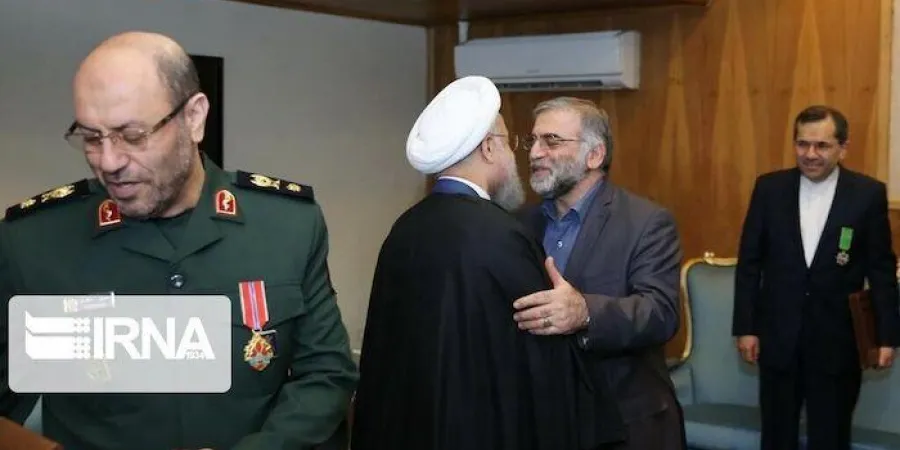Iran: Concern over mole in intelligence services following assassination of nuclear scientist
According to researchers specializing in Iran, the Iranian hierarchy is concerned about a "network of spies and moles" in the country's intelligence services
Dan Arkin
|
06/12/2020
The assassination of the senior nuclear scientist in Iran caused great shock in the country. The assassination of Fakhrizadeh uncovered "deep holes and breaches" in the protection, security and intelligence apparatuses in Iran. It would have been impossible to successfully carry out such an operation without networks of spies and moles planted deep inside the security apparatus and the intelligence community in Iran.
This was reported by the Christian Science Monitor in an investigative article on the assassination of the senior nuclear scientist. The newspaper interviewed analysts and researchers that have ties with Iran, and reported that the assassination involved 12 people who set up an ambush of Fakhrizadeh's convoy that consisted of four armored vehicles. Those details were given by a filmmaker, Javad Mogouei, who worked in the past with the Revolutionary Guard Corps, and whose account was backed up by family members quoted by the media in Iran.
The team of assassins used a car bomb, a machine gun, assault rifles and two snipers on a rural road about 40km from Tehran. The bodyguards of the murdered man were told by different intelligence agencies that they would be hit. Gen. Hossein Dehghan, the military advisor of Ayatollah Khamenei, said explicitly that "breaches, holes, and infiltrations" led to the murder.
The newspaper wrote that 10 years ago, following the assassination of several nuclear scientists, a special unit of the Revolutionary Guard Corps was given responsibility for guarding the scientists, and it is not clear whether that was the case on the day of the assassination of Fakhrizadeh, who had a senior position in the regime in Tehran and held the rank of deputy defense minister
Maysam Behravesh, a researcher specializing in Iran at research institutes in Sweden and Holland, who had ties with Iranian intelligence in the past, reported that the assassination was a major shock to Iran, "not because (they) didn’t expect it, but exactly because they did expect and prepare for it, and yet they couldn’t prevent it. This and past hostile operations could not have been carried out successfully, against all odds, had there not been a complex network of spies and moles deep in Iran’s security structure and intelligence community."
According to researchers specializing in Iran, the Iranian hierarchy is concerned about a "network of spies and moles" in the country's intelligence services
The assassination of the senior nuclear scientist in Iran caused great shock in the country. The assassination of Fakhrizadeh uncovered "deep holes and breaches" in the protection, security and intelligence apparatuses in Iran. It would have been impossible to successfully carry out such an operation without networks of spies and moles planted deep inside the security apparatus and the intelligence community in Iran.
This was reported by the Christian Science Monitor in an investigative article on the assassination of the senior nuclear scientist. The newspaper interviewed analysts and researchers that have ties with Iran, and reported that the assassination involved 12 people who set up an ambush of Fakhrizadeh's convoy that consisted of four armored vehicles. Those details were given by a filmmaker, Javad Mogouei, who worked in the past with the Revolutionary Guard Corps, and whose account was backed up by family members quoted by the media in Iran.
The team of assassins used a car bomb, a machine gun, assault rifles and two snipers on a rural road about 40km from Tehran. The bodyguards of the murdered man were told by different intelligence agencies that they would be hit. Gen. Hossein Dehghan, the military advisor of Ayatollah Khamenei, said explicitly that "breaches, holes, and infiltrations" led to the murder.
The newspaper wrote that 10 years ago, following the assassination of several nuclear scientists, a special unit of the Revolutionary Guard Corps was given responsibility for guarding the scientists, and it is not clear whether that was the case on the day of the assassination of Fakhrizadeh, who had a senior position in the regime in Tehran and held the rank of deputy defense minister
Maysam Behravesh, a researcher specializing in Iran at research institutes in Sweden and Holland, who had ties with Iranian intelligence in the past, reported that the assassination was a major shock to Iran, "not because (they) didn’t expect it, but exactly because they did expect and prepare for it, and yet they couldn’t prevent it. This and past hostile operations could not have been carried out successfully, against all odds, had there not been a complex network of spies and moles deep in Iran’s security structure and intelligence community."



